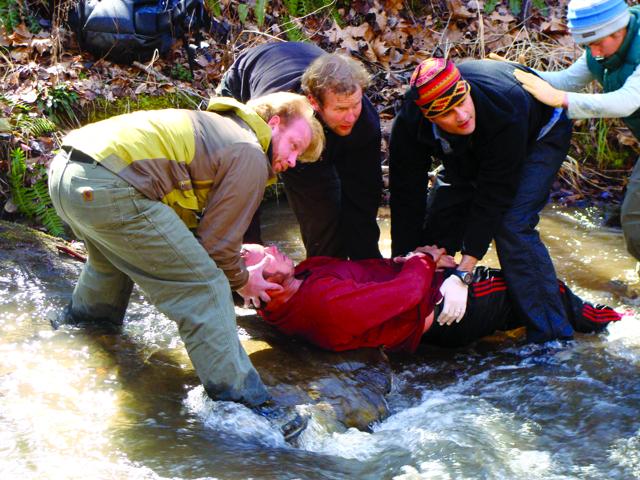Scott Lipscomb, an instructor with North Carolina Outward Bound, was leading a course near the headwaters of the Chattooga River when one of his students complained of a stomach cramp. Most people probably wouldn't have thought too much about it, but Lipscomb knew it could be something serious. After comparing the student’s symptoms against a checklist of possible causes of abdominal pain in the Field Guide to Wilderness Medicine, Lipscomb concluded there was a good chance the patient was suffering from appendicitis.
“My co-instructor and I weighed the student's symptoms against how far we had to go … and talked over our evacuation options before deciding that it just wasn't worth waiting around any longer and risking him having an appendix rupture in the field — a condition that can be life-threatening,” Lipscomb recalls. “We asked the student if he felt like he could hike out with our help, and when he said he could, we decided that we needed to do an immediate evacuation.”
After a grueling trek back to the trailhead that took six hours to cover 4.5 miles, the student was loaded into the Outward Bound van and driven to a nearby hospital. Upon arrival, doctors confirmed Lipscomb's assessment and performed an emergency appendectomy.
Thanks largely to the wilderness first responder training he’d received from Landmark Learning, a wilderness-medicine training center in Cullowhee, Lipscomb was able to quickly assess the student's medical condition and initiate the evacuation. If he hadn’t acted promptly, the situation could have spiraled into something much, much worse.
“The WFR training allowed me to assess this patient's condition and weigh that against [possible] outcomes for continuing or getting him out of the field,” Lipscomb explains. “There's a really fine line there when you weigh the risks involved with abdominal pain. It could be as little as gas, or it could be as bad as acute appendicitis. So sometimes it can be a hard call to make because, on any given course, odds are that a student is going to complain of a stomachache. Fortunately, in this situation, I was able to correctly identify the problem, and it turned out to be the right decision.”
WFR courses involve nine days of information and hands-on learning techniques covering a wide range of injuries, accidents and possible wilderness scenarios. The “woofer” training uses staged scenarios to teach the best approaches for safely evaluating, evacuating and caring for injured individuals in places far removed from a modern hospital.
“The scenarios that Landmark Learning provided me with in my training were real enough that it allowed me to handle the situation with this particular student with confidence, comfort and ease,” says Lipscomb.
Landmark Learning offers a variety of wilderness-medicine programs throughout the Southeast, utilizing policies and course guidelines laid out by the National Outdoor Leadership School's Wilderness Medicine Institute. Natalie Holland, student services coordinator at Landmark Learning, says the school educates thousands of people each year.
A less intensive option is the two- or three-day wilderness first aid courses, which offer a similar curriculum in condensed form.
Jay Long teaches such courses for the Red Cross in Asheville. “The Red Cross offers a very cost-effective program for the general public that is looking to learn these types of skills,” he reports. “Anyone can pick up a cell phone and call 911, but there are a lot of places in our area where cell phones don't work, so it's important to know how to handle medical problems in the wilderness setting.”
Long believes the growing popularity of outdoor-adventure sports such as kayaking, mountain biking, trail running and hiking inevitably leads to an increase in injuries. “Due to the nature of these types of sports, both beginners and experts alike are going to have injuries,” he notes. “But often, you are a couple hours away from help, as opposed to being a phone call away.”
Wilderness first aid, adds Lipscomb, “is an invaluable skill to have for anyone who plans on spending any amount of time in the wilderness. It provides you with a general awareness of what can happen: You know what to look for, and you're also there to assist other people if the need arises.”
Long concurs, emphasizing, “The skills that you're going to learn in the WFA program are skills you can use in any sort of environment.”
— Eric Crews spends his free time roaming the forests of Western North Carolina. He is currently working on a guide to recreational paddling in North Carolina.



Before you comment
The comments section is here to provide a platform for civil dialogue on the issues we face together as a local community. Xpress is committed to offering this platform for all voices, but when the tone of the discussion gets nasty or strays off topic, we believe many people choose not to participate. Xpress editors are determined to moderate comments to ensure a constructive interchange is maintained. All comments judged not to be in keeping with the spirit of civil discourse will be removed and repeat violators will be banned. See here for our terms of service. Thank you for being part of this effort to promote respectful discussion.